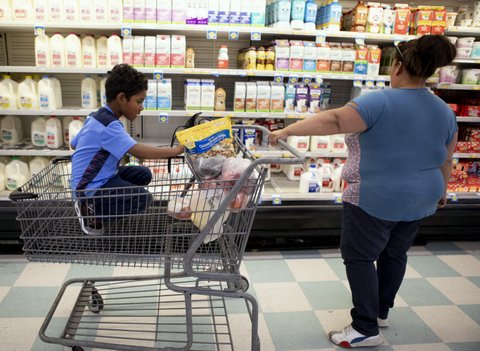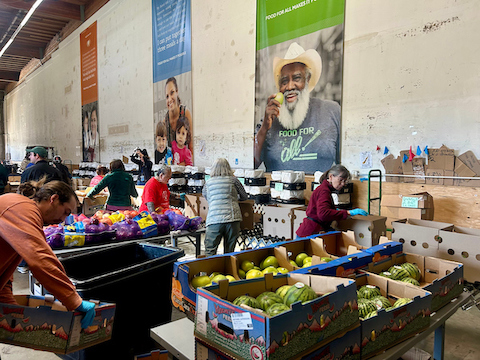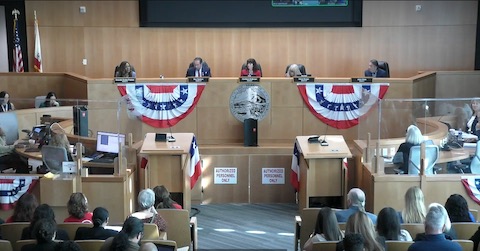
19 May Pandemic Food Stamps Offer Up to $365 Per Child

California is sending pandemic food cards to qualifying students. In this file photo, Antionette Martinez and her son Caden, 5, who receive CalFresh, do their weekly grocery shop at FoodMaxx on July 26, 2019. Photo by Anne Wernikoff for CalMatters
By Jacqueline García, La Opinión
Families with children who qualify for free or reduced-price meals at their schools — regardless of immigration status — may notice something in the mail to help them buy groceries.
California is issuing one-time food stamps with credits of up to $365 per child to help qualifying families get through the coronavirus outbreak. The Pandemic-Electronic Benefit Transfer card, or P-EBT, from the Department of Social Services is an emergency disaster benefit that can be used to buy food and groceries, including online at Walmart and Amazon.
The first cards arrived last week for families receiving CalFresh, Medi-Cal or foster care benefits as a supplement to their EBT card. The second phase, which starts Friday, requires low-income families to apply at https://ca.p-ebt.org/.
The deadline to apply is June 30.
The timing of this extra boost comes as many families struggle to provide nutritious meals for their children while schools are closed in response to the novel coronavirus.
Betzabe Castillo, who has a 9-year-old son at a public school in Stockton, California, was among the first to receive the P-EBT cards. She welcomes the help since her husband is the only one bringing in an income. Their rent is nearly $2,000 a month.
“It is very difficult because rent does not wait, the bills do not either,” Castillo said. “We are surviving day to day.”
Berenice Burgos, who has two children, ages 9 and 4, also received a P-EBT card last week. She wasn’t aware of the extra help but was grateful when it arrived in the mail.
“Right now I am not working and my husband, who is a mechanic, got his hours cut,” said Burgos, who lives in Concord, in Northern California. “It is very good help, especially for my children – to buy their milk, cereal and fruit because they want to eat all day.”
Much needed help while schools are closed
Jason Montiel, a spokesman for the social services department, said the state is offering additional assistance to children who are eligible for free or reduced price meals while school is closed.
The cards are distributed in two phases. The first batch of about 2 million went to families who enrolled in CalFresh, Medi-Cal, or foster care.
“For this phase, the beneficiaries do not have to do anything and the card will be mailed to them,” Montiel said.
The second phase requires residents to apply. The state projects an additional 1.8 million more children are eligible.
State officials say the card is available to eligible families regardless of a student’s immigration status or their parents’ status. It also doesn’t impact whether children are picking up grab-and-go meals from schools.
The food card isn’t considered a public charge by the Department of Homeland Security. However, the U.S. Citizenship and Immigration Services may consider several factors under its public charge test. Those who have questions should seek legal advice.
State officials also want recipients to be on alert for scams. Since the P-EBT cards began arriving in the mail, some recipients have received calls from people posing as social service representatives seeking personal information.
“The Department of Social Services will not contact clients or ask for personal information,” said Montiel. “We will not request a Social Security Number or any document that is shared with us.”
How do I learn more?
For more information about the P-EBT card visit:
Those interested should apply between May 22 and June 30:
If you have questions regarding public charge, visit: https://covid19.ca.gov/img/wp/listos_covid_19_immigrant_guidance_en_daf.pdf
Jacqueline García is a reporter with La Opinión. This article is part of The California Divide, a collaboration among newsrooms examining income inequity and economic survival in California.






No Comments